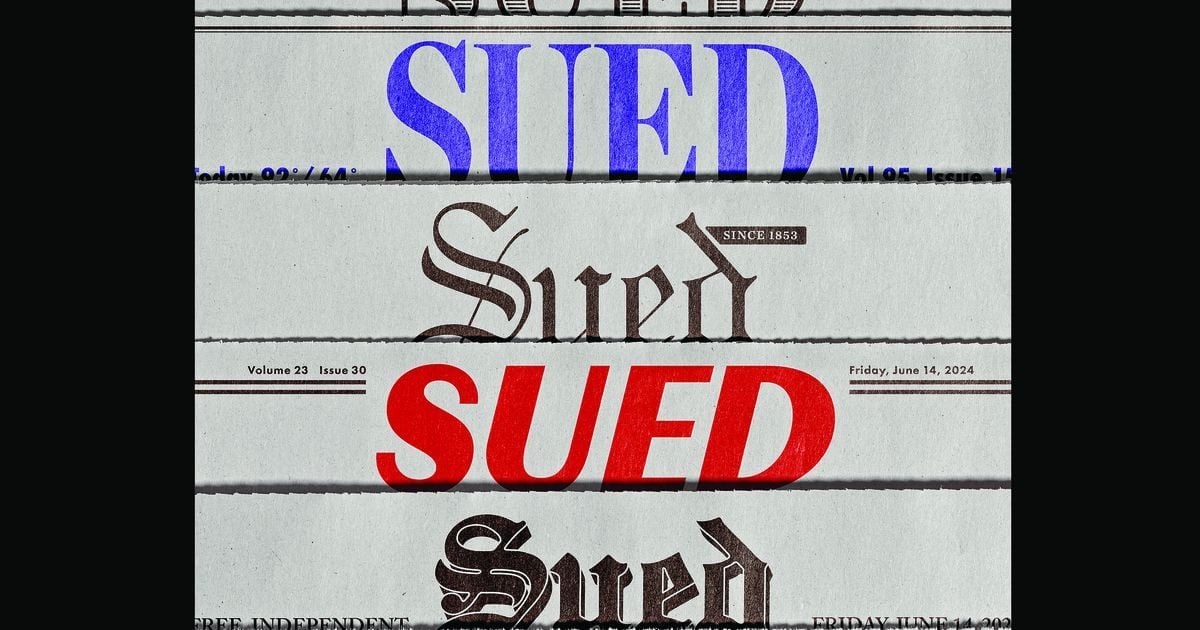Slow-moving lawsuits intended to drain newsrooms of their limited financial resources and editorial bandwidth. Threats of jail time for journalists who expose political corruption and refuse to give up their sources and turn over their notes. Judges with close ties to the politicians who have attacked reporters and their coverage.
If you think these things sound outlandish in America, take a close look at what’s happening here in Mississippi. All these possibilities are the subject of very serious conversations I’m having this week with my colleagues as the editor in chief of Mississippi Today, a nonprofit newsroom that covers the state’s politics.
A former governor of our state — a central subject of our Pulitzer Prize-winning investigative reporting — filed a motion on Tuesday asking a judge to find our newsroom in contempt of court because we refused to turn over our notes and sources to him. Breaching the confidentiality of sources violates one of the most sacred trusts — and breaks one of the most vital tools — in investigative journalism. No serious news organization would agree to this demand.
As boisterous leaders like Gov. Ron DeSantis of Florida work consciously to erode First Amendment protections, the use of a defamation lawsuit against small but energetic newsrooms like ours could become a political playbook for an attack on the American free press. In the 1964 case The New York Times Company v. Sullivan, the Supreme Court made it harder for public officials to win defamation cases, forcing them to prove that actual malice occurred, but the time and costs of a yearslong lawsuit over actual malice would threaten our newsroom’s financial livelihood. Even if we were to prevail in our defense of this suit, we will probably have lost in many other ways.
If we’re forced to spend our limited resources on legal fees to defend a meritless lawsuit, that’s less money we can devote to the costly investigative journalism that often is the only way taxpayers and voters learn about how their leaders truly behave when they believe no one is watching.
A former Mississippi governor, Phil Bryant, operating within a state judicial system he helped build, is using a defamation lawsuit to try to obtain access to our editorial notes, internal communications and names of our sources. His lawsuit does not challenge the accuracy of the reporting, but Mr. Bryant has made clear he wants everything we’ve got related to our acclaimed investigation that revealed the depths of his involvement in the state’s welfare scandal.
That scandal featured prominent Mississippi leaders and celebrities who were among those who benefited from at least $77 million in misspent funds — federal grant money intended to help the poorest residents of America’s poorest state.
Mr. Bryant sued Mississippi Today in July 2023, arguing our newsroom defamed him in our description of our investigation into his role in the welfare scandal, which won us the 2023 Pulitzer Prize for Local Reporting.
For nearly a year now, Mr. Bryant has used the suit to strain our nonprofit newsroom’s finances and small staff’s energy, repeatedly adding amendments to his original complaint. Since filing his lawsuit last year, he added me and our investigative reporter Anna Wolfe as defendants, along with adding several of Ms. Wolfe’s more recent articles about new developments in the state’s continuing efforts to recoup misspent funds.
We believe this legal tactic is intended to chill our reporting of the current state and federal investigations into the welfare misspending — and the numerous charged defendants in the welfare case who have argued in court filings that Mr. Bryant approved or directed them to make some of the welfare expenditures now questioned by state or federal prosecutors.
We stand by every word of our reporting, we have not let this lawsuit intimidate us, and we feel strongly we will prevail in the end. But a sobering new case development has led international media rights organizations to support our defense and inspired the intense internal conversations about some deeply disturbing possibilities.
Last month, the state court judge presiding over the case — an appointee of Mr. Bryant’s successor, Gov. Tate Reeves — ordered us to turn over confidential source documents regarding our reporting on Mr. Bryant. We asked the Mississippi Supreme Court to hear our emergency appeal, arguing the order was unconstitutional. We also asked the court to stay the order while the justices consider our plea to recognize a reporter’s privilege, which serves as a basis of protection and privacy for journalists and the sources who share important information with the press. (I published an editor’s note about all this in early June.)
But our appeal, while strongly rooted in clear case-law precedent of 40 U.S. states, is politically perilous: The nine-member Mississippi Supreme Court is made up of four Bryant appointees and at least two others who received Mr. Bryant’s public endorsement for election back in 2012.
The stakes are incredibly high: The court could guarantee these critical free-press rights for the first time in our state’s history, or it could establish a dangerous precedent for Mississippi journalists and the public at large by tossing aside an essential First Amendment protection.
Mississippi is one of eight states without a formal shield law protecting reporters from having to reveal sources, but the state’s courts have recognized some version of a privilege for journalists against disclosing certain information. According to one analysis, the “majority” of Mississippi’s trial courts have done so. But because none of those lower court decisions were decided by an appellate court, the precedent has not been set. This is why the state Supreme Court’s consideration of our appeal is so important.
While we await word on whether our appeal will be accepted, Mr. Bryant filed a motion on June 11 asking the state court judge to hold us in contempt of court for “refusing to produce what is likely hundreds, if not thousands, of pages of documents and communications.” Clearly, he wants much more than what we were ordered to turn over, which demonstrates the importance of why we felt the appeal was necessary.
We have no direct reason to believe that the state judge or our state Supreme Court justices will disregard their oaths of office and not “administer justice without respect to persons.” But this is Mississippi — a state where a majority of the high court is politically aligned with a former governor who once publicly called our journalists “Liberals at an online Democratic propaganda machine.” Frankly, it’s impossible not to worry about how the politics of Mississippi’s system of government could affect the outcomes of this case.
If we were to be held in contempt of court, individual defendants could face jail time; our nonprofit news organization could face hefty fines; or the judge could issue a default judgment against us in favor of the plaintiff, who has asked the court for more than $1 million in damages. Any of those scenarios could threaten our staffers’ freedom and our newsroom’s long-term sustainability.
Yes, things have become tenuous for us in Mississippi, but our case is perhaps one legal decision from being a problem the entire country must grapple with.
If we were to lose on a final judgment from the Mississippi Supreme Court, our remaining legal remedy would be an appeal to the U.S. Supreme Court on First Amendment grounds. And every American journalist is keenly aware that some on the court may relish an opportunity to reconsider federal legal precedents which grant most press freedoms.
The all-important Sullivan decision is just one of several cases we’re relying on for our defense and could be on the line before the U.S. Supreme Court. Two justices have already called on the court to reconsider that decision, which established the doctrine requiring public officials (and later, all public figures) to prove actual malice in order to win defamation cases.
It is not difficult to see how the lawsuit against us could become part of a broader effort to dismantle press freedoms for journalists across the nation. If journalist freedoms are stripped from us in Mississippi or elsewhere, the corruption and wrongdoing from our government leaders could go more easily unseen. Every citizen — not just the journalists — would be harmed.
While we hope our case doesn’t go this far, we could be on the front end of yet another instance that proves you don’t have to live in Mississippi to be profoundly affected by our government’s and our courts’ stances on constitutional rights.
Adam Ganucheau is the editor in chief of the nonprofit news organization Mississippi Today, which won the Pulitzer Prize for local reporting in 2023. This article originally appeared in The New York Times.
function onSignUp() { const token = grecaptcha.getResponse(); if (!token) { alert("Please verify the reCAPTCHA!"); } else { axios .post( "https://8c0ug47jei.execute-api.us-east-1.amazonaws.com/dev/newsletter/checkCaptcha", { token, env: "PROD", } ) .then(({ data: { message } }) => { console.log(message); if (message === "Human



























